
The French horn is a brass instrument made of tubing wrapped into a coil with a flared bell. The double horn in F/B♭ is the horn most often used by players in professional orchestras and bands, although the descant and triple horn have become increasingly popular. A musician who plays a horn is known as a horn player or hornist.
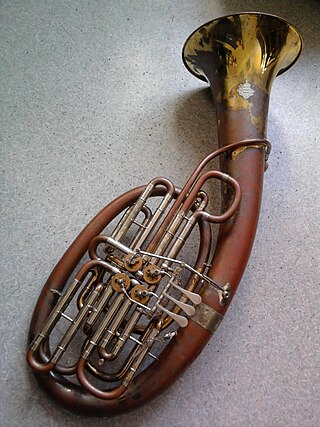
The Wagner tuba is a four-valve brass instrument commissioned by and named after Richard Wagner. It combines technical features of both standard tubas and French horns, though despite its name, the Wagner tuba is more similar to the latter, and usually played by horn players. Wagner commissioned the instrument for his four-part opera cycle Der Ring des Nibelungen, where its purpose was to bridge the acoustical and textural gap between the French horn and trombone.
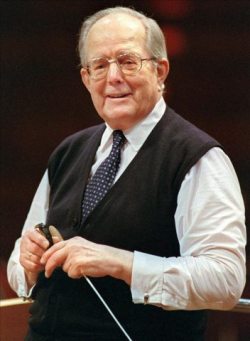
Wolfgang Sawallisch was a German conductor and pianist.
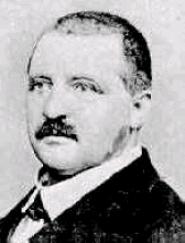
Anton Bruckner's Symphony No. 2 in C minor, sometimes known as the "Symphony of Pauses", was completed in 1872. It was actually the fourth symphony composed by Bruckner, after the Symphony in F minor (1863), the Symphony No. 1 in C minor (1866), and the Symphony in D minor (1869).

Radovan Vlatković is a Croatian-born horn player. He was the former principal horn of the Berlin Radio Symphony Orchestra. He left that post in 1990 to devote himself to a solo career and has recorded many of the major works for horn. He is now professor of horn at the Mozarteum in Salzburg, Austria and at the Reina Sofía School of Music in Madrid. Vlatković also participates as a senior artist at the Marlboro Music Festival, and has performed in chamber music and solo recital for the Philadelphia Chamber Music Society.
An Alpine Symphony, Op. 64, is a tone poem for large orchestra written by German composer Richard Strauss in 1915. It is one of Strauss's largest non-operatic works; the score calls for about 125 players and a typical performance usually lasts around 50 minutes. The program of An Alpine Symphony depicts the experiences of eleven hours spent climbing an Alpine mountain.

Albrecht Mayer is a German classical oboist and conductor. The principal oboist of the Berlin Philharmonic, he is internationally known as a soloist and chamber musician and has made many recordings.
Erich Wolfgang Korngold composed his Violin Concerto in D major, Op. 35, in 1945.

Don Quixote, Op. 35 is a tone poem by Richard Strauss for cello, viola, and orchestra. Subtitled Phantastische Variationen über ein Thema ritterlichen Charakters, the work is based on the novel Don Quixote de la Mancha by Miguel de Cervantes. Strauss composed this work in Munich in 1897. The premiere took place in Cologne on 8 March 1898, with Friedrich Grützmacher as the cello soloist and Franz Wüllner as the conductor.
Stephen Fox is a British clarinetist, saxophonist and clarinet maker, based in Richmond Hill, Ontario, Canada.
Engelbert Brenner, was a soloist on oboe and then English horn who played for 41 years with the New York Philharmonic Orchestra.

Engelbert Zaschka was a German chief engineer, chief designer and inventor. Zaschka is one of the first German helicopter pioneers and he is a pioneer of flying with muscle power and the folding car. Zaschka devoted himself primarily to aviation and automotive topics, but his work was not limited to them.
Richard Ayres is a British composer and music teacher.
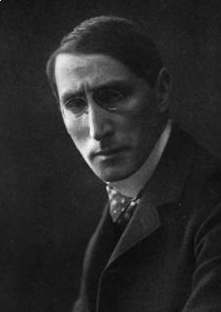
Oskar Fried was a German conductor and composer. He was known as a great admirer of Gustav Mahler, whose works he performed many times throughout his life. Fried was also the first conductor to record a Mahler symphony. He held the distinction of being the first foreign conductor to perform in Russia after the Bolshevik Revolution (1922). He eventually left his homeland in 1933 to work in the Soviet Union after the political rise of Adolf Hitler's Nazi Party, and became a Soviet citizen in 1940.

Engelbert Humperdinck was a German composer. He is known widely for his opera Hansel and Gretel (1893).

Radek Baborák is a Czech conductor and French horn player.
Hermann Wolfgang Sartorius Freiherr von Waltershausen was a German composer, conductor, teacher and writer.
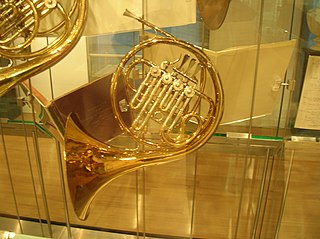
The German horn is a brass instrument made of tubing wrapped into a coil with a flared bell, and in bands and orchestras is the most widely used of three types of horn, the other two being the French horn and the Vienna horn. Its use among professional players has become so universal that it is only in France and Vienna that any other kind of horn is used today. A musician who plays the German horn is called a horn player. The word "German" is used only to distinguish this instrument from the now-rare French and Viennese instruments. Although the expression "French horn" is still used colloquially in English for any orchestral horn, since the 1930s professional musicians and scholars have generally avoided this term in favour of just "horn". Vienna horns today are played only in Vienna, and are made only by Austrian firms. German horns, by contrast, are not all made by German manufacturers, nor are all French-style instruments made in France.











